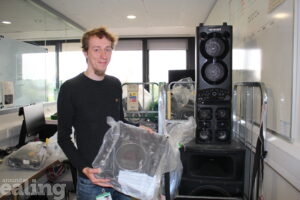Becoming carbon neutral by 2030 is no easy task, but that is exactly the challenge that Ealing Council has set itself as it looks to respond to the climate emergency and support residents to lead greener lives.
From moving around the borough, to the way waste is processed, achieving big results means making bold and ambitious changes. This is why, in May, the council’s cabinet confirmed a number of steps to help achieve this aim.
Many of the adjustments we need to make to combat climate change can result in hugely positive changes in other areas of our lives, and these are known as co-benefits.
Co-benefits can help local communities across the borough to become healthier, happier and create opportunities for employment – while addressing climate change simultaneously.
The council’s draft strategy for the climate emergency focuses on five main areas, energy, food, green infrastructure, transport and waste.
Energy
Heating our homes is one of the main causes of harmful carbon emissions in the UK. As part of the council’s commitment to create 2,500 genuinely affordable homes by 2022, all new council homes will have to be designed to zero-carbon standards. Existing council homes across the borough will be retro-fitted to improve their energy performance.
Food
How we source, grow, cook and dispose of our food has wide-ranging impacts on the climate.
The council will work with local food producers to create more opportunities for food to be produced and used locally, reducing the miles involved in transportation and cutting our carbon footprint.
Green infrastructure
The council is increasingly switching to using electric vehicles and is also doing the same with
vehicles and power tools used for maintaining our parks and green spaces. Meadows, hedgerows and tree canopies are being expanded across the borough to help tackle emissions and boost biodiversity.
Transport
Nearly a third of our borough’s carbon emissions come from the way we travel and during the lockdown the borough saw a glimpse into the benefits of less traffic as air quality improved and quieter roads meant more space for cyclists and pedestrians.
The council is working to provide more safer spaces for walking and cycling and will aim to help make these the preferred way for residents to make all short journeys. The council has also provided more than 130 on-street electric vehicle charging points (EVCP) and aims to ensure all residents will be within a five-minute walk of an EVCP by 2025.
Waste
The council will work with residents to reduce waste, and to help them recycle wherever possible. Greener Ealing has been set up to manage waste collections in the borough and aims to help further increase household recycling rates to 60% by 2022.
JUST 10 YEARS LEFT TO ACT
Councillor Mik Sabiers, the council’s cabinet member for environment and highways, explained: “We are treating climate change as a crisis, and we need a swift and sweeping response to tackle it.
“The plans tackle carbon reduction from a number of key areas, including transport, as well as supporting local businesses so they can thrive and be ecologically sound at the same time.
“In 2018 the UN reported that we had 12 years left to act on climate change to avoid a global disaster, and last year, we declared a climate emergency.
“Acting now on climate change will dramatically improve the council’s environmental performance and help to protect residents from the impacts of climate change in the future.”
GET INVOLVED
The task ahead is immense, and local people are urged to get involved, share their views and help shape the response.
Visit the council’s website or email climateaction@ealing.gov.uk for further information.
Local people are urged to get involved in bringing these plans to fruition and can join the council’s climate action team and Imperial College London on 22 July for a webinar discussing the plans.
One of the leading thinkers in this area, Dr Neil Jennings of the Grantham Institute at Imperial College London will be presenting ideas around co-benefits and how the community can get involved.
- Book your place at the webinar here.







